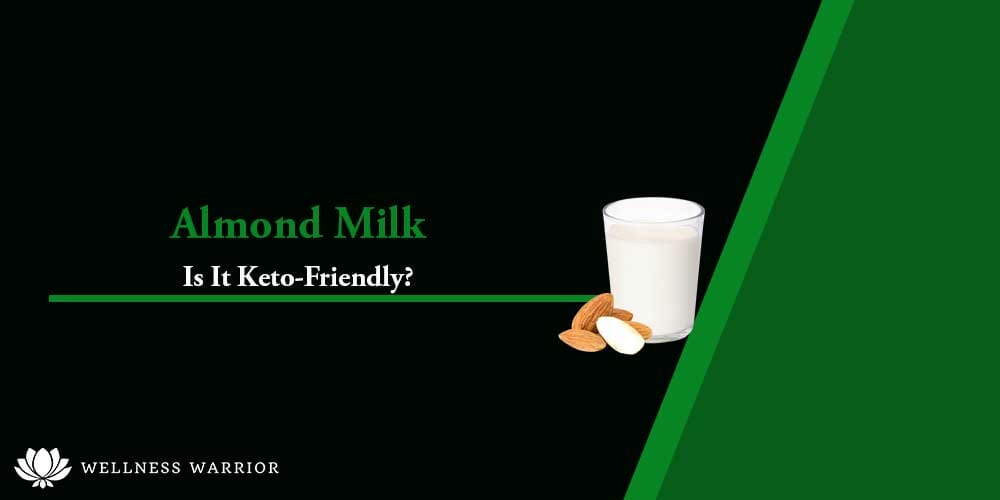The keto diet is such a delicate thing because even the slightest mistake in terms of food you eat can throw you entirely out of ketosis.
As such, you must pay keen attention to your net carbs.
Every now and then, we all enjoy some good almond milk with our cereal, in baking recipes, smoothies, etc., and it is the go-to dairy-free milk for most vegans and vegetarians.
Almond milk is also great for people with dairy sensitivity.
- But is it suitable to be had on a keto diet?
- Is almond milk keto-friendly?
In this article, we answer these questions, as well as look at what almond milk actually is, its nutritional makeup, health benefits, and much more.
How Many Carbs Are In Almond Milk?

What is Almond Milk?
Almond milk keto milk is a plant-based cow’s milk alternative and is possibly the most commonly used one.
It is made by soaking almonds with water overnight and then grounding them to create a milky substance.
It is then strained to remove the pulp and what is left is the actual almond milk.
Sometimes, the almond and water are blended with other ingredients to make the milk flavored or sweetened.
While almond milk is typically made commercially, you can also quickly make unsweetened almond milk at home.
Overall, almond milk is delicious with a nutty flavor, which, as you can imagine, comes from the almonds.
The more natural it is, the nuttier it will taste, like if you make your own almond milk.
Is Almond Milk Healthy?
Yes, almond milk is healthy and is actually quite nutritious. Plus, it is low in calories.
In fact, each cup or 240 ml of almond milk contains only 39 calories. At the same time, other kinds of milk are high in calories.
Here’s what you will get from having one cup of almond milk:
- Calories: 39
- Fat: 3 grams
- Protein: 1 gram
- Carbs: 3.5 grams
- Fiber: 0.5 grams
- Calcium: 24% of the Daily Value
- Potassium: 4% of the Daily Value
- Vitamin D: 18% of the Daily Value
- Vitamin E: 110% of the Daily Value
Health Benefits of Almond Milk
1) Antioxidants
Almond milk is an excellent source of antioxidants that aid in protecting your body from free radical cellular damage.
This is due to its extremely high Vitamin E content.
Vitamin E has also been shown to improve cardiac health by helping to protect your body against damage that may lead to heart disease.
Further, Vitamin. E is particularly beneficial to eye and skin health.
2) bone growth and repair
Additionally, almond milk is quite good for bone growth and repair, as it is also fortified with calcium and vitamin D, especially if it’s all-natural, like the unsweetened almond milk you can buy at the store made from organic almonds.
3) low in sugar
If you have ever tried a few types of almond milk, then you will notice that the unsweetened almond milk, as the name suggests, has a way lower sugar content than the flavored and sweetened types that may contain artificial sweeteners.
As such, it may be a great option for those who enjoy almond milk but need to lose body fat or have diabetes.
Is Almond Milk Keto-friendly?
Almond milk is keto-friendly, as it has a low net carbs content, making it suitable for your ketogenic diet.
Almond milk has approximately 3.5 grams of net carbs per cup.
However, not all almond milk is low carb enough to be included in your keto diet without the risk of going over your daily amount of net carbs.
To ensure that you can have almond milk while maintaining your low-carb keto diet, always read the milk label thoroughly before purchasing.
If a sweetener is added, it makes almond milk a bit higher on the carb content chart, whereas unsweetened almond milk is best for low-carb diets.
Try using no more than one cup of unsweetened almond milk in your keto diet, as you need to stick to high-fat and low-carb foods to successfully see results on a keto diet.
If you choose to use the sweetened almond milk, you must use way less, such as 1/4 cup.
Downsides to Almond Milk
While almond milk is suitable for a keto diet, it is essential that you get sight of the entire picture so that you can make a truly informed decision.
1) Low protein
Almond milk has a very low protein content; about 1 gram of protein per cup.
Consequently, it may not be ideal for aiding with muscle growth, skin and bone growth and repair, and enzyme and hormone production, along with other vital body functions and processes that protein plays an essential role in.
2) Nut allergy
If you have a nut allergy, then almond milk is certainly not for you.
Almond is a form of nut, and if you have even sensitivity to nuts, consuming almond milk could trigger a reaction.
3) It May contain additives
The processed/sweetened almond milk may contain a series of additives that may adversely affect your keto diet.
These additives include gums, lecithin, salt, gums, artificial flavors, and sugar.
Consuming too much sugar can certainly knock you off your ketogenic diet and increase the likelihood of weight gain instead of weight loss, as well as chronic conditions.
4) Low dietary fiber
There is little to no fiber in almond milk, depending on the type.
As such, it lacks an essential element to aid with gut health.
How to Make Your Own Unsweetened Almond Milk
This is a simple almond milk recipe for approximately 4 cups (1 liter) of almond milk:
Ingredients:
- 2 cups (280 grams) of soaked almonds
- 4 cups (1 liter) of water
- 1 teaspoon (5 ml) of vanilla extract (optional)
directions
Soak the almonds in water overnight and drain them before use.
Next place the almonds, water, and vanilla into a blender and blend until the water is cloudy and the almonds are finely ground.
How long you blend it is dependent on the blender that you have. Usually, 2 minutes are enough.
Pour the blended almonds into a mesh strainer that is placed over a bowl and lined with a nut milk bag or cheesecloth.
Press down to remove the liquid from the pulp.
You can store your milk in the refrigerator and it should last for up to 5 days.
Keto Almond Milk Alternatives
If you’re looking for a keto-friendly milk replacement for almond milk, there are plenty of options that you can look into whether you want something dairy-free or not.
Plant-based almond milk alternatives
- Whole milk
- Coconut milk
- Cashew milk
- Hazelnut milk
- Soy milk
- Oat milk
- Rice milk
Using dairy milk or goat’s milk may not be the best alternatives, as they are high in natural sugar and carbs, which may ruin your ketogenic diet.
Additionally, though the plant-based alternatives are best, you may want to use oat and rice milks as a last gasp, since they have pretty high carbs content.
Final Thoughts
Almond milk is healthy low-carb milk, making it suitable for a ketogenic diet.
Also, almond milk holds a significant amount of nutritional value and can even help to prevent cardiovascular disease.
If you prefer to opt out of having almond milk because of its downsides, you can choose from a series of other low-carb diet friendly milks.
Of note, any of these lactose-free options can contain a lot of carbohydrates.
Again, it is dependent on the type you buy; that is flavored or unflavored and the amount you consume.
These factors play a massive role in determining how many carbs you intake.
As such, it is essential that you read all nutrition facts on each store-bought product before making a purchase.
